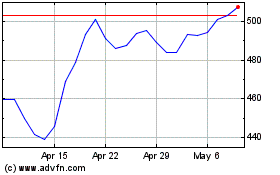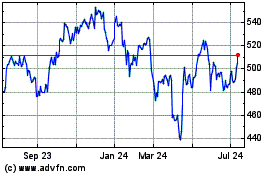By Gunjan Banerji
The Dow Jones Industrial Average crossed 28000 for the first
time Friday, notching a new record as fading recession fears
extended the decadelong bull-market rally.
A furious rise in the final minutes of the trading session
thrust the Dow above its latest milestone, re-energizing a stock
market that appeared listless in recent days.
Investors drove the Dow up 222.93 points, or 0.8%, to 28004.89
-- its 11th record close of 2019 -- as they cheered trade
developments and a rosier economic outlook. The blue-chip gauge has
logged four straight weeks of gains.
The S&P 500 and technology-heavy Nasdaq Composite also
closed at records, extending their weekly winning streaks to six
and seven, respectively.
This week's optimism was spurred, in part, by White House
economic adviser Lawrence Kudlow who indicated progress toward a
potential trade deal with China and Federal Reserve Chairman Jerome
Powell who noted strength in the economy. A better-than-feared
corporate earnings season has also helped fend off fears of a
downturn that had weighed on markets in recent months.
Meanwhile, fresh data Friday showed U.S. retail sales rebounded
in October, rising 0.3% after a drop the previous month. Those
figures bolstered confidence in the U.S. consumer, a key engine of
domestic growth, and followed a strong earnings report from
Walmart. The retail giant on Thursday reported another increase in
sales, marking a five-year streak of quarterly sales gains.
Those developments reignited investor enthusiasm about the final
stretch of 2019, particularly in light of the Federal Reserve's
three interest-rate cuts this year. Many investors had previously
been wary of a redo of 2018, when an autumn selloff erased a rally
that had been months in the making.
Now, many predict the recent rally to continue.
"Ever so slowly...you get increasing confirmation that this
slowdown has stabilized," said Joseph Amato, chief investment
officer at Neuberger Berman. "All these things have come together
to build a little bit more confidence in risk assets."
The Dow's climb above 28000 marked its first thousand-point
milestone since July. Much of those gains -- 434 points -- were
powered by Apple whose shares have advanced 32% since mid-July.
That was followed by Microsoft, which added 78 points.
In Friday's session, the biggest winners were shares of
health-care companies including UnitedHealth Group and Pfizer. A
far-reaching plan released by the Trump administration showed that
hospitals and insurers would be forced to disclose secret,
negotiated rates for the first time.
The S&P 500 finished the week 0.9% higher. Its six
consecutive weeks of gains are the longest such stretch in two
years. The Nasdaq Composite advanced 0.8% this week.
Strong retail earnings like those from Walmart have spurred
optimism that a strong holiday season could be ahead. Shares of
J.C. Penney rose 6.4% Friday after the retailer boosted its
financial outlook for the year and reported better-than-expected
third-quarter results.
Investors have also been encouraged by a rebound in
government-bond yields, particularly in the U.S. The growing
positive gap between 10-year yields and two-year yields has helped
ease fears about a potential recession.
"Much of this rally over the past 30 days is the reassessment of
the recession risk that was increasingly priced into the market,"
said Bob Browne, chief investment officer of Northern Trust Corp.
"We would expect this momentum to continue going into the end of
the year."
The string of records for stocks comes as broader markets have
been in a lull. In one sign of how sleepy trading has been, the Dow
finished unchanged earlier this week for only the third time since
2000.
The S&P 500, meanwhile, hadn't moved up or down more than
0.5% for nine consecutive trading days through Thursday, the
longest streak since October 2018, according to Dow Jones Market
Data.
This is partially driven by mixed signals of progress between
the U.S. and China that have left investors in a lurch, analysts
said.
"I think the uncertainty is still elevated," said Justin
Onuekwusi, head of retail multiasset funds at Legal & General
Investment Management. "Just because you see an improvement doesn't
mean it's gone away," he said.
Though stock investors appeared elated, caution was evident in
traditionally safer investments this week, as investors also
scooped up haven assets like Treasurys and gold. The yield on the
10-year Treasury note fell to 1.833%, its biggest one-week yield
decline in a month. Gold prices edged higher.
Some analysts said big risks have receded lately, rather than
positive news emerging to help drive stocks higher.
For example, though retail sales didn't disappoint, the data
stood in contrast to U.S. factory production, which fell in
October. Mr. Powell told lawmakers Thursday that the U.S.-China
trade conflict has weighed on domestic manufacturing activity.
Elsewhere, Hong Kong's Hang Seng Index was flat Friday but ended
the week down 4.8%, its worst week since early August, after
antigovernment protests in the Chinese territory turned more
violent with some of the worst clashes in six months of unrest. The
Shanghai Composite Index ended the week down 2.5%.
Paul J. Davies and Caitlin Ostroff contributed to this
article.
Write to Gunjan Banerji at Gunjan.Banerji@wsj.com
(END) Dow Jones Newswires
November 15, 2019 17:41 ET (22:41 GMT)
Copyright (c) 2019 Dow Jones & Company, Inc.
UnitedHealth (NYSE:UNH)
Historical Stock Chart
From Mar 2024 to Apr 2024

UnitedHealth (NYSE:UNH)
Historical Stock Chart
From Apr 2023 to Apr 2024
